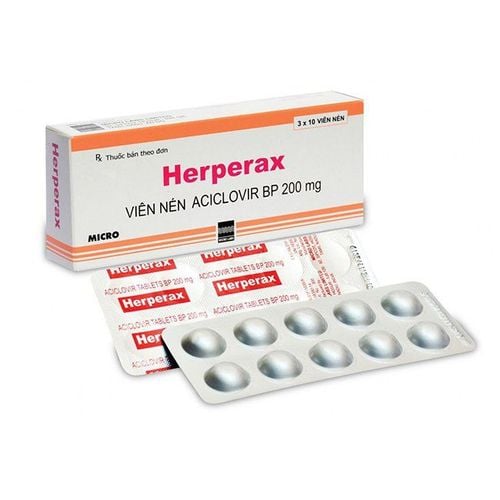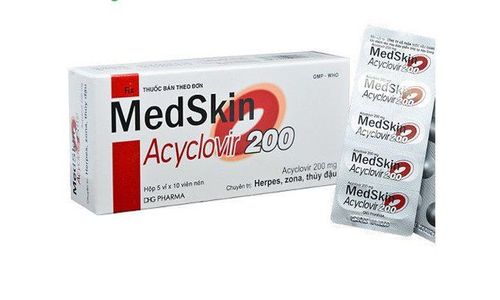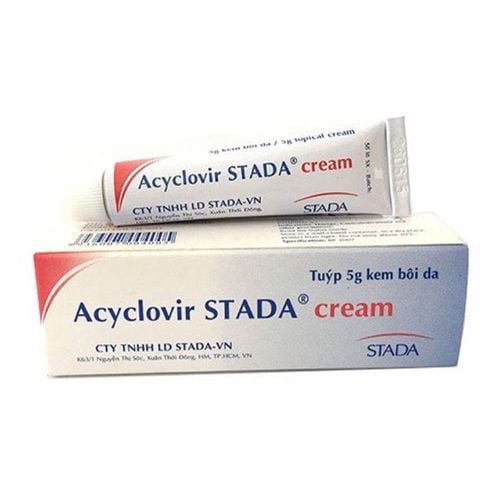This is an automatically translated article.
Herpes is the most common sexually transmitted virus in the US with 45 million people carrying it. Genital herpes caused by the herpes virus can cause a serious infection or death in an infant if the mother is infected with the virus at the time of childbirth. The virus also makes it easier for people to get infected with HIV and other sexually transmitted diseases.
1. What is genital herpes?
Genital herpes is caused by the herpes simplex virus (HSV). There are two strains of the virus:
HSV-2 is the most common cause of genital herpes. HSV-1, which causes cold sores or fever blisters, which many people get on their lips, can also cause genital herpes. The virus can be spread through both vaginal or anal intercourse and oral sex. This virus is spread easily by contact with herpes sores. However, the virus can also spread from an infected person without any signs or symptoms of infection.
2. What are the symptoms after being infected with the Herpes virus?
The genital herpes virus is passed from one person to another through sexual contact. This happens even if the person with the virus has no symptoms or signs of infection.
Once the virus enters the skin, it travels along the nerve pathways. It may not work in the nerves and stay there permanently.
Over time, viruses can become active. When that happens, the virus travels along nerve pathways to the surface of the skin. At this point, the virus can cause a variety of symptoms. In many cases, the active virus is easily passed from one person to another through sexual contact. Even wearing a condom cannot completely protect a partner from infection. The number of relapses or outbreaks of herpes virus disease can vary from person to person.
3. Symptoms of genital herpes caused by Herpes

Mụn rộp sinh dục
Although a person infected with the Herpes virus may not have any symptoms, some people may notice symptoms within a few days to a few weeks after exposure. Or, the person may not have the initial outbreak until months or even years after being infected.
When genital herpes symptoms occur soon after infection, the person tends to have more severe genital herpes symptoms. The disease may begin as itching, burning, discomfort in some areas of the skin and mucous membranes. After that, there are acne-filled pimples with white pus, the skin around the acne spots is red. These warts usually appear on the vulva, vagina, labia majora, labia minora, anus, buttocks, cheek area, lips, oral cavity, thighs (female) or mouth, chin, lips, anus, skin scrotum, groin, shaft of the penis, buttocks, glans, foreskin, thighs, legs of men. These blisters can stay for about 1-2 weeks then start to crust and gradually disappear without any treatment. In fact, the Herpes virus is only temporarily hidden for a while, then after a few months, the condition recurs.
When the disease recurs, the patient has a fever, headache, body fatigue, aching limbs, swollen lymph nodes, muscle pain, poor appetite. More rarely, some men with genital herpes may have additional symptoms of pus discharge from the stoma, for women, more vaginal discharge, with a bad odor.
4. Diagnosis and treatment of genital herpes caused by Herpes
Genital herpes is diagnosed by a physical exam and is usually identified with a swab test or blood test.
Currently there is no cure for genital herpes completely. But symptoms can be reduced and prevented with treatment, and the purpose of treatment is also to reduce the risk of infecting others.
Your doctor may prescribe antiviral medication to help prevent or relieve pain and discomfort from an outbreak of symptoms. Medicines taken daily to suppress the virus can reduce the number of outbreaks and reduce the risk of infecting others.

Đi khám bác sĩ để được chẩn đoán cũng như điều trị mụn rộp sinh dục
5. Does genital herpes recur?
After a person is infected with the herpes virus, there can be 4 to 5 outbreaks of genital herpes within the first 1 year. Over time, the patient's body produces and builds up more immunity to the virus, so outbreaks can be less or even stop completely in some people.
6. Causes of recurrent genital herpes?
When symptoms recur, they usually appear when the person has symptoms of psychological stress or has other illnesses. It is during this time that the body's immune system is less able to suppress the virus and render it inactive. Symptoms recur when:
Fatigue Having other medical conditions After sex During menstruation Stress After surgery After trauma.
7. Can symptoms be treated at home?
There are a number of things people can do to reduce the discomfort and severity of symptoms during flare-ups. Home treatment includes:
Taking pain relievers such as aspirin, acetaminophen or ibuprofen. Wash the painful area with a warm salt water solution twice a day. Allow air to circulate around the sore by wearing loose clothing. Place an ice pack on the painful area. Wrap the ice pack in a towel or cloth. Rest much. There are also ways for sick people to avoid transmitting the virus to other parts of their body, as well as to other people. Take the following steps:
Don't kiss when the sick person or partner has mouth sores. Avoid oral sex when either partner has mouth or genital sores. Do not come into contact with the genitals or anus when there are any sores. Wash your hands with soap and water after touching infected areas. Do not wet contact lenses with saliva.
8. How does genital herpes affect health?
For most people, genital herpes is not a serious health threat. Besides discomfort, herpes virus infection is a psychological stressor because
Creates anxiety Affects self-esteem Affects patient's sense of security and affection However, In some cases, complications from genital herpes can be serious, even life-threatening.
Although rare, pregnant women can pass herpes to their babies. This can lead to serious and sometimes fatal infections in the child. That's why it's recommended that you take steps to prevent flare-ups at the time of delivery starting at 34 weeks of pregnancy. If there are signs of an active viral infection at the time of delivery, your doctor may recommend a cesarean section.
People with genital herpes are at high risk of HIV infection because cracks and sores in the skin create openings through which the HIV virus can enter the body.
Package of Social Diseases Examination and Screening of Vinmec International General Hospital helps customers to screen for social diseases in order to detect diseases early for effective treatment and avoid complications.
Please dial HOTLINE for more information or register for an appointment HERE. Download MyVinmec app to make appointments faster and to manage your bookings easily.
Reference source: Webmd.com












